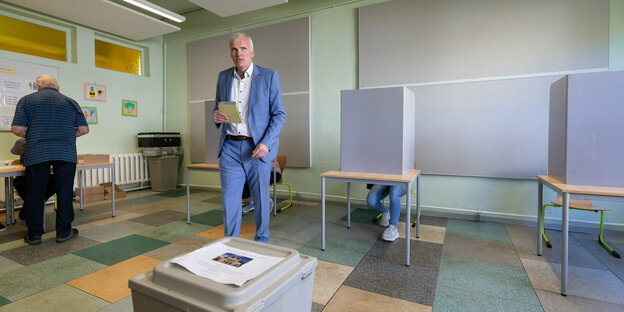In Thuringia, local elections are seen as a mood test before the state elections. The AfD cannot gain the upper hand anywhere. But she didn’t lose either.
Only second in the first voting round: Erfurt mayor Andreas Bausewein (SPD) casts his vote Photo: Michael Reichel/dpa
ERFURT taz | When the first numbers appear on the screen in the ballroom of Erfurt’s town hall at 6:53 p.m., there is a brief applause. The city has invited its citizens to follow the election results together in the capital. The room is well filled. Politicians from the CDU, SPD, Greens and AfD are present, local radio broadcasts live. According to the preliminary results, CDU candidate Andreas Horn is in the lead with 25 percent, while incumbent mayor Andreas Bausewein follows in second place with 21 percent.
Also the AfD candidate Stefan Möller is in the audience. He puts his hands on his hips and looks at the screen. The co-state chairman is in third place with 18 percent. However, only 33 of the 210 districts have been counted so far. “Satisfied with the result?” asks a gentleman with a mustache who is apparently filming on his cell phone. “Not yet,” Möller answers. If this remained the case, he would be out of the race for mayor, while the CDU and SPD would go for a majority in the second round of elections within fourteen days.
But in many other districts and independent towns in Thuringia the situation is different in next Sunday’s local elections: In the Wartburg district, the Ilm district and the Kyffhäuser district, the AfD is in second place. In Altenburger Land, the AfD candidate Heiko Philipp even received the most votes, but will probably also have to enter the second round – at least according to the interim results at the time of going to press.
In fact, this Sunday is only about local elections: about 1.7 million Thuringians were allowed to vote for about 7,500 places in district councils, city and municipal councils, as well as more than 1,000 district and local mayors, 94 mayors and mayors: within as well as the district executive positions in 13 of the 17 districts.
Local politics – and yet there was great national interest: what do the results say about the state elections on September 1? What support does the AfD receive? At least on the first try, she failed to win district offices or town halls.
More than a mood test
But the AfD could also expand its influence in Thuringia through local parliaments or through second elections, without having to rely on alliances. For example in Sonneberg, where AfD politician Robert Sesselmann won the district elections last year. However, so far he has not had a majority in the district council and has therefore failed, for example with his initiative to cancel democracy projects.
If the AfD now gains a majority in the local parliament, Sesselmann could govern. At the time of going to press, no results were yet available for the district council in Sonneberg.
In addition, local elections are seen as a mood test. In the election of district administrators and mayors in Thuringia, approximately 21 percent of the votes went to the AfD. Significantly less than the 30 percent the AfD currently receives in surveys for the state elections.
However, experience with previous elections shows that the results cannot be transferred one to one. In the last local elections of 2019, the CDU emerged as the strongest party. But a few months later, the left won the state elections with 31 percent.
The state is currently governed by the left, SPD and Greens in a minority coalition. has been Prime Minister ever since 2014 almost continuously Bodo Ramelow (left) – only interrupted in 2020 by Thomas Kemmerich (FDP). After the state elections, the CDU and AfD elected him prime minister – causing a crisis that spread beyond Thuringia.
At the time, there were nationwide demonstrations against the FDP because they had allied with the fascists of the AfD in Thuringia. The CDU had to justify itself because it had actually decided not to cooperate with the AfD. Finally, the then Chancellor Angela Merkel (CDU) and the FDP chairman Christian Lindner Kemmerich, the only FDP Prime Minister, was forced to resign after a few days to have.
Against this background, the state elections in Thuringia will take place on September 1 this year. Most circumstances that were difficult then have not become easier today.
What the local elections have shown, however, is that despite the AfD’s recent scandals in Thuringia and internationally, the party’s candidates have received the second-most votes in many elections and are expected to advance to the second election.
It was not enough for Stefan Möller in Erfurt. The Thuringian AfD state leader next to Björn Höcke is out of the elections. However, another right-winger reached the second round without the AfD: the nationally known neo-Nazi Tommy Frenck took second place in the district elections in Hildburghausen with 24.9 percent of the votes. He received 63 votes more than CDU candidate Dirk Lindner.
